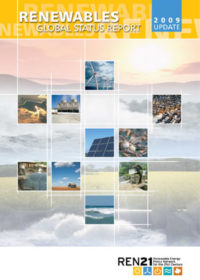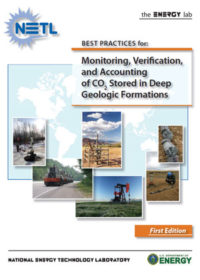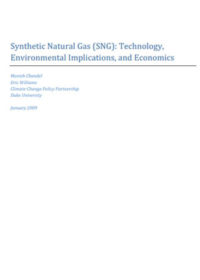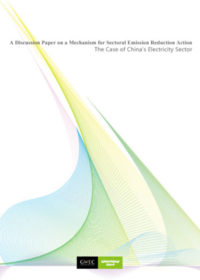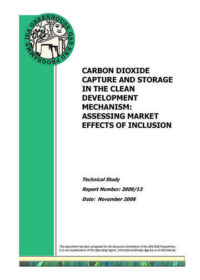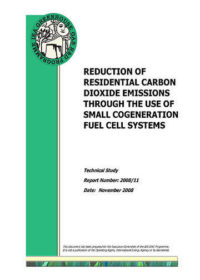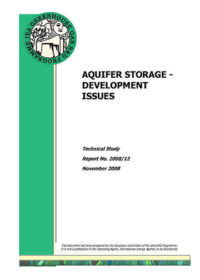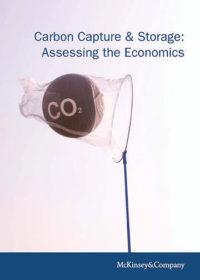Resources
Publications
Our publications, reports and research library hosts over 500 specialist reports and research papers on all topics associated with CCS.
View our Publication Library Disclaimer.
Filter by
The natural fix? The role of ecosystems in climate mitigation
1st January 2009
Topic(s): Health safety and environment
Large cuts in emissions of greenhouse gases are needed if we are to avoid the worst effects of global climate change. This Rapid Assessment Report describes the vital contributions which ecosystems can and must make to improve these efforts. It presents carbon capture and storage through a Green Economy lens, outlining the potential in terms of natural systems, from forests to grasslands which have been doing the job in a tried and tested way for millennia. Currently the world's ecosystems instead of maintaining and enhancing nature's carbon capture and storage capacity, are being depleted at an alarming rate. This authoritative report, compiled for World Environment Day on 5th June, underlines a far greater potential across a wider suite of natural systems: a potential to not only combat climate change and climate-proof vulnerable economies but to also accelerate sustainable development and the achievement of the poverty related Millennium Development Goals.
Disclaimer
The content within the Global CCS Institute Publications, Reports and Research Library is provided for information purposes only. We make every effort and take reasonable care to keep the content of this section up-to-date and error-free. However, we make no claim as to its accuracy, currency or reliability.
Content and material featured within this section of our website includes reports and research published by third parties. The content and material may include opinions and recommendations of third parties that do not reflect those held by the Global CCS Institute.
Reconciling King Coal and Climate Change: A regulatory framework for carbon capture and storage
1st January 2009
Topic(s): Policy law and regulation
This paper provides an overview of CCS technology and then focuses on what the authors see as the major gaps in the US system for regulating CCS. These gaps are first, the unresolved property law issues and second, the issue of long term liability for stored CCS.
Disclaimer
The content within the Global CCS Institute Publications, Reports and Research Library is provided for information purposes only. We make every effort and take reasonable care to keep the content of this section up-to-date and error-free. However, we make no claim as to its accuracy, currency or reliability.
Content and material featured within this section of our website includes reports and research published by third parties. The content and material may include opinions and recommendations of third parties that do not reflect those held by the Global CCS Institute.
Scenarios on the introduction of CO2 emission performance standards for the EU power sector
1st January 2009
Topic(s): Energy efficiency, Policy law and regulation
In this paper, the introduction of Emission Performance Standards (EPS) as a means for po-tential emission reductions in the European power sector was assessed. EPS in the power sec-tor can already be found in California, USA, since 2007 as well as in the US states of Oregon, Washington and Montana, which introduced EPS schemes following the example of Califonia.
Disclaimer
The content within the Global CCS Institute Publications, Reports and Research Library is provided for information purposes only. We make every effort and take reasonable care to keep the content of this section up-to-date and error-free. However, we make no claim as to its accuracy, currency or reliability.
Content and material featured within this section of our website includes reports and research published by third parties. The content and material may include opinions and recommendations of third parties that do not reflect those held by the Global CCS Institute.
Advancing technology transfer for climate change mitigation: Considerations for technology orientated agreements promoting energy efficiency and carbon capture and storage (CCS)
1st January 2009
Topic(s): Carbon capture use and storage (CCUS), Policy law and regulation
The study examines the international governance of technology transfer, the performance of different instruments in delivering new technologies, and reviews proposals aiming at increased technology transfer. The study further examines a number of critical (pre)conditions for technology oriented treaties that can effectively promote technology transfer both within or outside the UNFCCC framework - in two technology spheres: carbon capture and storage (CCS) technologies, and technical applications for energy efficiency within the building sector.
Disclaimer
The content within the Global CCS Institute Publications, Reports and Research Library is provided for information purposes only. We make every effort and take reasonable care to keep the content of this section up-to-date and error-free. However, we make no claim as to its accuracy, currency or reliability.
Content and material featured within this section of our website includes reports and research published by third parties. The content and material may include opinions and recommendations of third parties that do not reflect those held by the Global CCS Institute.
Renewables global status report 2009 update
1st January 2009
Topic(s): Domestic policy, Economics, Global Status Report, Policy law and regulation, Renewables
This ‘Update’ edition of the Renewables Global Status Report is the fourth in a series launched in 2005. It provides an integrated picture of the global renewable energy situation, while coming in the midst of an historic and global economic crisis.
Disclaimer
The content within the Global CCS Institute Publications, Reports and Research Library is provided for information purposes only. We make every effort and take reasonable care to keep the content of this section up-to-date and error-free. However, we make no claim as to its accuracy, currency or reliability.
Content and material featured within this section of our website includes reports and research published by third parties. The content and material may include opinions and recommendations of third parties that do not reflect those held by the Global CCS Institute.
Best practices for: monitoring, verification, and accounting of CO2 stored in deep geologic formations
1st January 2009
Topic(s): Carbon capture use and storage (CCUS)
This document was developed by the US Dept. of Energy’s National Energy Technology Laboratory for regulatory organisations, project developers, and national and state policymakers to increase awareness of existing and developing monitoring, verification, and accounting (MVA) techniques used during carbon sequestration.
Disclaimer
The content within the Global CCS Institute Publications, Reports and Research Library is provided for information purposes only. We make every effort and take reasonable care to keep the content of this section up-to-date and error-free. However, we make no claim as to its accuracy, currency or reliability.
Content and material featured within this section of our website includes reports and research published by third parties. The content and material may include opinions and recommendations of third parties that do not reflect those held by the Global CCS Institute.
Synthetic natural gas (SNG): technology, environmental implications, and economics
1st January 2009
Topic(s): Biofuels / Bioenergy, Fuel switching, Renewables
Natural gas that can be produced from coal or biomass is known as ’synthetic natural gas’ or ’substitute natural gas’ (SNG). This Duke University paper examines the different technologies for SNG generation, the cost, and the environmental impacts of SNG. The paper identifies the conditions under which SNG production could be economically viable.
Disclaimer
The content within the Global CCS Institute Publications, Reports and Research Library is provided for information purposes only. We make every effort and take reasonable care to keep the content of this section up-to-date and error-free. However, we make no claim as to its accuracy, currency or reliability.
Content and material featured within this section of our website includes reports and research published by third parties. The content and material may include opinions and recommendations of third parties that do not reflect those held by the Global CCS Institute.
A discussion paper on a mechanism for sectoral emission reduction action: the case of China’s electricity sector
1st December 2008
Topic(s): Domestic policy, Economics, Renewables
The authors of this paper discuss mitigation and financing potentials of China’s electricity sector. It is a very large emitting sector, and there are many technologies available for improving emissions performance. They believe there are significant potential benefits both for sustainable development in developing countries and for the global atmosphere. However, they emphasise that theirs is a proposal for a voluntary mechanism, therefore countries must be convinced that it is in their best interests in order for it to proceed.
Disclaimer
The content within the Global CCS Institute Publications, Reports and Research Library is provided for information purposes only. We make every effort and take reasonable care to keep the content of this section up-to-date and error-free. However, we make no claim as to its accuracy, currency or reliability.
Content and material featured within this section of our website includes reports and research published by third parties. The content and material may include opinions and recommendations of third parties that do not reflect those held by the Global CCS Institute.
Carbon dioxide capture and storage in the clean development mechanism: assessing market effects of inclusion
13th November 2008
Topic(s): Carbon capture use and storage (CCUS), Carbon markets, Policy law and regulation
The report presents findings associated with the possible inclusion of carbon dioxide capture and geological storage (CCS) within the Kyoto Protocol’s clean development mechanism (CDM), and the potential repercussions this could have on the global regulated carbon market.
In order to achieve this, it examines the effects of creating additional certified emission reduction (CER) 'offsets' from CCS activities to the pool available for compliance by Annex B Parties to the Kyoto Protocol. The study also considers implications for 2020 in order to gauge potential market effects of CCS in any future, yet-to-be-agreed, post-2012 international carbon trading mechanism.
Disclaimer
The content within the Global CCS Institute Publications, Reports and Research Library is provided for information purposes only. We make every effort and take reasonable care to keep the content of this section up-to-date and error-free. However, we make no claim as to its accuracy, currency or reliability.
Content and material featured within this section of our website includes reports and research published by third parties. The content and material may include opinions and recommendations of third parties that do not reflect those held by the Global CCS Institute.
Reduction of residential carbon dioxide emissions through the use of small cogeneration fuel cell systems
11th November 2008
Topic(s): Energy efficiency, Fuel switching
Combined heat and power systems (CHP) enable users to operate with increased overall efficiency thus reducing consumption of fossil fuels and green house gas emissions. This study investigates the potential of fuel cell based CHP systems in domestic and small commercial applications to reduce green house gas emissions. Fuel cells in this application have advantages of very low emissions and potentially higher power to heat ratios than other CHP systems.
Disclaimer
The content within the Global CCS Institute Publications, Reports and Research Library is provided for information purposes only. We make every effort and take reasonable care to keep the content of this section up-to-date and error-free. However, we make no claim as to its accuracy, currency or reliability.
Content and material featured within this section of our website includes reports and research published by third parties. The content and material may include opinions and recommendations of third parties that do not reflect those held by the Global CCS Institute.
Aquifer storage: development issues
1st November 2008
Topic(s): Carbon capture use and storage (CCUS), CO2 storage
Earlier studies by IEA GHG had shown that of the main geological storage reservoirs available globally for CO2 storage, deep saline aquifers have the highest storage potential and substantial cuts in CO2 emissions may therefore require utilisation of deep saline aquifers as storage reservoirs. However, the storage capacity of deep saline aquifers from various estimates show wide bounds: from 1,000 to over 10,000 GtCO2 globally. Many of the deep saline aquifers being considered for storage are ‘virgin’ formations and structures in which little or no geological characterisation has taken place, in contrast to many oil and gas fields. Therefore, considerable exploratory work will be required before such structures can be considered as “fit for purpose” for CO2 storage. Selection of safe and secure geological reservoirs must be accompanied by confidence in the associated CO2 storage capacities.
The aim of this study was to bring together and review the research that has been undertaken in Europe, North America, Japan and Australia, to develop an understanding of how knowledge on deep saline aquifers has developed in recent years, in particular since the 2005 IPCC Special Report on CO2 Capture and Storage (IPCC SRCCS). Emphasis was placed on the identification of knowledge gaps and priority areas for R&D activities.
Disclaimer
The content within the Global CCS Institute Publications, Reports and Research Library is provided for information purposes only. We make every effort and take reasonable care to keep the content of this section up-to-date and error-free. However, we make no claim as to its accuracy, currency or reliability.
Content and material featured within this section of our website includes reports and research published by third parties. The content and material may include opinions and recommendations of third parties that do not reflect those held by the Global CCS Institute.
Carbon capture & storage: Assessing the economics
22nd September 2008
Topic(s): Carbon capture use and storage (CCUS), Economics
CCS is in a relatively early phase of development, with several key questions remaining, including its costs, timing, and relative attractiveness versus other low carbon opportunities. Furthermore a survey in April 2007 by MIT showed low public awareness of CCS in the US. Other interviews have shown that some confusion around the true economics of CCS exists, exacerbated by the wide range of cost numbers quoted and the limited information on how they are derived. For these reasons, this report aims to create a brief, objective, fact-based, and generally accessible overview of CCS, focusing on the economics and key issues, to help stakeholders understand and assess the technology. It will look ahead as far as 2030. The report has built as much as possible on existing knowledge. It has been based on technologies and measures that are currently relatively well known and understood and likely to be commercially available within the time period covered in this report.
Disclaimer
The content within the Global CCS Institute Publications, Reports and Research Library is provided for information purposes only. We make every effort and take reasonable care to keep the content of this section up-to-date and error-free. However, we make no claim as to its accuracy, currency or reliability.
Content and material featured within this section of our website includes reports and research published by third parties. The content and material may include opinions and recommendations of third parties that do not reflect those held by the Global CCS Institute.




